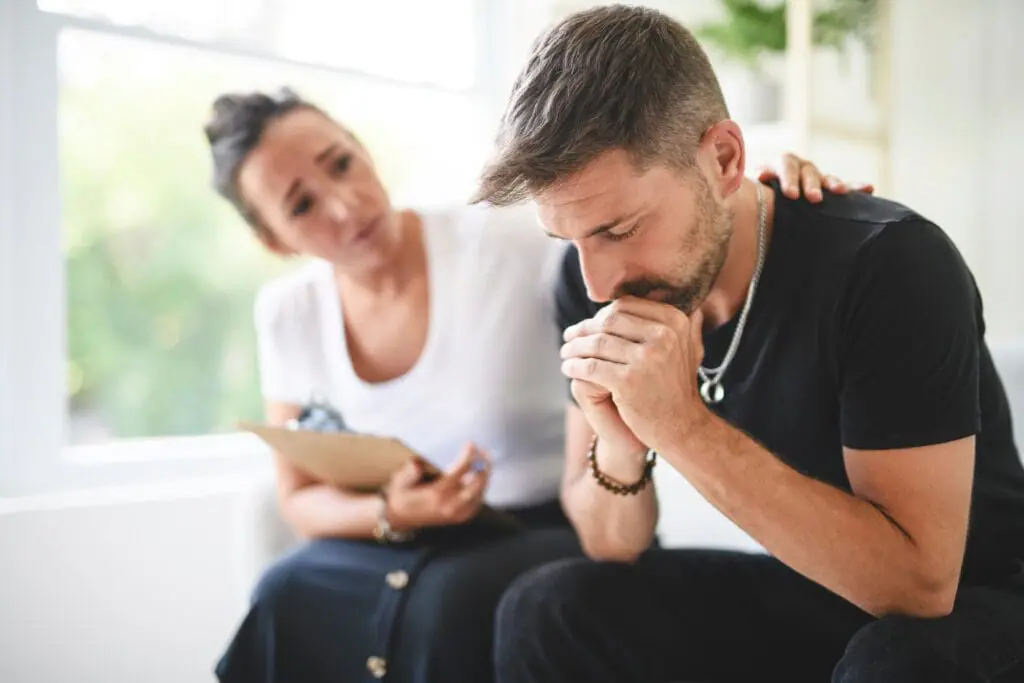What Is Anxiety?
Anxiety can be defined as an emotion marked by tension, worrisome thoughts, at times, physiological changes such as increased blood pressure lasting for a prolonged period.1
While a certain amount of anxiety is essential for survival, understanding the difference between normal anxiety and an anxiety disorder that requires medical attention can aid in diagnosis and treatment. The duration or severity of emotions usually distinguishes between simply feeling nervous and having an anxiety attack.2
What Is Alcoholism?
Alcohol Use Disorder (AUD), generally known as alcoholism, is a chronic medical condition marked by overdrinking alcohol. Alcoholism refers to the inability to control drinking due to physical and emotional dependence on alcohol despite adverse social, occupational, or health consequences. Alcoholism can be mild, moderate, or severe. The long-term effects of alcohol abuse on the brain can lead to dependence making individuals subject to relapse when alcohol use is discontinued.
How Common Is Alcoholism?
Alcoholism is quite common and affects people of all demographics and races. According to the 2019 National Survey on Drug Use and Health (NSDUH), 14.5 million (almost 15 million) persons in the United States from age 12 and older (5.3 percent) had some form of alcohol use disorder. The same survey recorded that men were more likely to have issues with alcoholism when compared to women.3
How Does Drinking Alcohol Affect Anxiety?
Alcohol can, on its own, worsen and even cause anxiety. Although, alcohol and anxiety can occur independently. Anxiety can come about due to imbalances of neurotransmitters in the brain. Alcohol impairs the levels of certain neurotransmitters, such as serotonin. This process due to drinking alcohol has been seen to cause lasting anxiety, which persists hours to days after the initial intake of alcohol.4
Extreme forms of anxiety from alcohol are known as alcohol panic attacks. Unfortunately, certain people believe alcohol helps anxiety and may be drinking to cope with stress, not knowing alcohol triggers anxiety leading to severe anxiety after drinking.
How Are Anxiety Disorders and Alcohol Use Related?
Comorbidity involving alcohol use disorder and anxiety disorders is quite common. A profound relationship between anxiety and alcoholism is observed. This can be due to individuals using alcohol to numb the effects of persistent anxiety and alcohol use itself, causing anxiety disorders. Alcohol has a depressant impact on the brain and, when ingested, may help in stress relief, but this benefit of alcohol and anxiety is only temporary. Inversely, the biochemical effects of alcohol on the brain have worsened and led to anxiety after drinking alcohol.
Can Drinking Alcohol Lead to An Anxiety Disorder?
Persistent anxiety from alcohol use disorder is more likely to occur in long-term heavy drinkers, which is described as alcohol causing anxiety. While occasional anxiety after drinking alcohol can be seen in anyone. Studies have shown that unregulated drinking and anxiety are quite common. Drinking can induce alcohol panic attacks, panic hangover symptoms, or anxiety while drinking in people prone to anxiety. On the other hand, moderate drinking (when overdrinking is avoided) does not cause anxiety.
Does Alcohol Interact with Anxiety Medications?
Anxiolytics of various classes are often prescribed to help treat and manage anxiety disorders. Many of these anxiety medications contain central nervous system depressive properties, which can interact with alcohol in the bloodstream.
Alcohol is also a central nervous system depressant. When anxiety medications are taken with alcohol, side effects of anxiolytics such as sleepiness and worsened respiratory depression (slowed breathing) can worsen. As a result, alcohol must be avoided during the management or treatment of anxiety and alcoholism. Drinking and anxiety treatment can lead to serious adverse effects.
How Much Is Too Much Alcohol?
A moderate drink of alcohol depends on several factors, including the kind of alcohol preparation being taken (beer, wine, gin, etc.) and individual tolerance, amongst others. Too much alcohol would be alcohol intake above two drinks per day for males or one drink per day for women.
As defined by the National Institute on Alcohol Abuse and Alcoholism (NIAAA), alcohol intake is said to be too much when alcohol consumption results in a blood alcohol concentration (BAC) of 0.08 percent (or 0.08 grams) of alcohol per deciliter, or higher. This pattern corresponds to a typical adult consuming five or more drinks (male) or four or more drinks (female) in two hours.6
What Are Healthy Ways to Cope with Anxiety?
While most people with clinical anxiety disorders require psychotherapy or medication to manage their symptoms, lifestyle changes and healthy coping methods can also help recovery and anxiety management a whole lot easier. Some healthy coping ways to cope with and reduce anxiety include:
- Meditation: Employing Relaxation techniques involving meditation can help alleviate varying degrees of anxiety. Activities such as visualization and yoga are examples of stress management and relaxation strategies that can help with anxiety.
- Calming Exercise: Exercise is a potent stress reliever that can enhance general mood and health while battling anxiety. When dealing with anxiety, it’s critical to establish a pattern that includes light physical activity on most days of the week. This exercise should be self-paced and controlled to prevent physiological stress.
- Journaling: Keeping track of thoughts might help determine anxiety triggers and shed light on what aspect of treatment or the recovery process has been beneficial in managing anxiety.
Types of Anxiety Disorders
There are many different types of anxiety disorders, including:
- Generalized Anxiety Disorder (GAD): This form of anxiety disorder is marked by chronic anxiety, exaggerated worry, and tension, even when there is little or no trigger
- Panic Disorder: This is characterized by unexpected and recurring episodes of acute fear and physical symptoms such as chest pain, heart palpitations, shortness of breath and even abdominal discomfort.
- Social Phobia (or Social Anxiety Disorder): This anxiety disorder presents excessive self-consciousness and overwhelming anxiety in daily social interactions. This phobia might be specific to one setting (for example, a dread of speaking in formal or casual situations), or it can be so broad that a person has symptoms practically every time they are around others.5
Side Effects of Alcohol Misuse
Alcohol is a potent substance that can harm practically every organ in the body, including the brain, bones, and heart, and has short-term and long-term side effects. Side effects of alcohol that can be seen a day after binge drinking and some of the dangers of alcohol abuse include:
- Agitation
- Anxiety
- Elevated blood pressure and heart rate
- Increased body temperature
- Nausea
- Panic attacks
- Vomiting
Treatment for Alcohol Use and Anxiety at San Diego Detox
One of our goals at San Diego Detox is to tailor our treatment program according to every individual’s needs. For that reason, we offer a variety of treatment programs for anxiety with alcohol use disorder. Over time, we’ve discovered that many patients benefit from a combination of treatments, especially for treating co-occurring anxiety and alcoholism. Our services for anxiety and alcohol treatment include the following:
Alcohol Detoxification
Detoxification involves the total and gradual removal of substances, in this case, alcohol, from the body. At the San Diego detox center, the detoxification process is initiated and completed under the supervision of experts. There is also close monitoring and management of any withdrawal symptoms that may develop. This would prevent alcohol panic attacks, especially in patients used to taking alcoholic drinks to calm nerves or calming drinks for anxiety.
Residential Care
In our residential program, patients receive expert care in a homely environment built to ensure every patient’s comfort. Residential care also features counseling and therapy, which are beneficial for anxiety and alcohol treatment and recovery.
Support Groups
During patients’ rehabilitation, they will have the opportunity to connect with other patients in support groups. The goal is to assist them in combating isolation, which is a significant adversary of recovery. Support groups help motivate patients and spot signs of relapse or bad habits through healthy interactions. Support groups are highly beneficial for alcohol and anxiety recovery.
For more information, help, and treatment of excessive use of alcohol and anxiety attacks, alcohol, and stress, anxiety from alcohol and anxiety while drinking, give us a call at San Diego Detox today.
Resources
https://www.apa.org/topics/anxietyhttps://www.medicalnewstoday.com/articles/323454
https://www.niaaa.nih.gov/publications/brochures-and-fact-sheets/alcohol-facts-and-statistics
https://www.healthline.com/health/alcohol-and-anxiety#:~:text=How%20alcohol%20worsens%20anxiety,an%20entire%20day%20after%20drinking
https://www.hhs.gov/answers/mental-health-and-substance-abuse/what-are-the-five-major-types-of-anxiety-disorders/index.html
https://www.niaaa.nih.gov/publications/brochures-and-fact-sheets/understanding-alcohol-use-disorder
https://www.webmd.com/anxiety-panic/guide/anxiety-disorders






